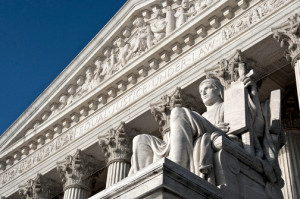 A divided Supreme Court upheld a legal standard on Thursday that makes housing discrimination illegal—even in cases where it is not intentional. In a 5-4 decision, the Supreme Court ruled that the Texas Department of Housing and Community Affairs was liable for violating the Fair Housing Act when it incorrectly allocated low-income housing tax credits to neighborhoods that were already heavily populated by minorities. To help combat subtle discriminatory practices, the legal standard known as “disparate impact” was added to the Fair Housing Act in 1988. It allows for discrimination claims against unintentional practices that have a discriminatory effect. Developers, housing authorities, and opponents of the court’s decision expressed concern that the ruling will cost considerable time and money to avoid legal liability.
A divided Supreme Court upheld a legal standard on Thursday that makes housing discrimination illegal—even in cases where it is not intentional. In a 5-4 decision, the Supreme Court ruled that the Texas Department of Housing and Community Affairs was liable for violating the Fair Housing Act when it incorrectly allocated low-income housing tax credits to neighborhoods that were already heavily populated by minorities. To help combat subtle discriminatory practices, the legal standard known as “disparate impact” was added to the Fair Housing Act in 1988. It allows for discrimination claims against unintentional practices that have a discriminatory effect. Developers, housing authorities, and opponents of the court’s decision expressed concern that the ruling will cost considerable time and money to avoid legal liability.
To learn more, read the entire article.
Image Source: Mark Fischer
